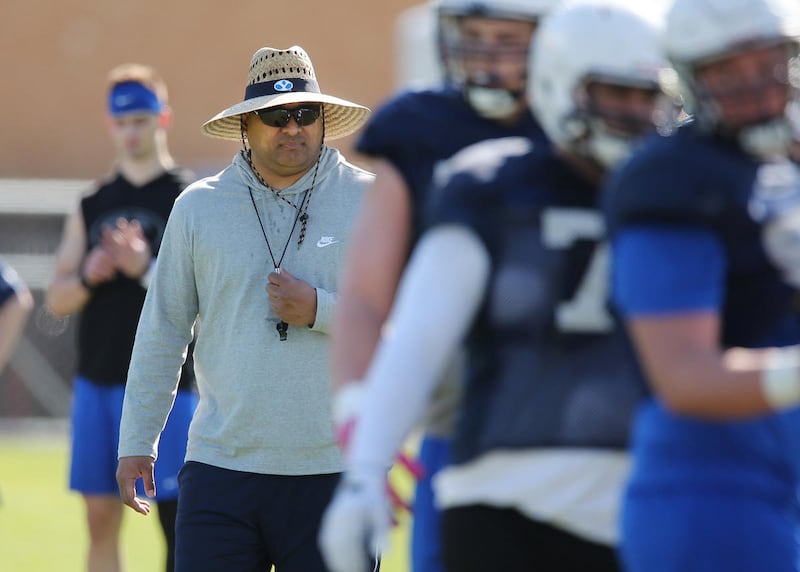PROVO — Thursday’s rivalry game against No. 14 Utah is one that BYU football coach Kalani Sitake absolutely has to win if he hopes to avoid looking over his shoulder the rest of the season.
A case could be made that his future in the program depends on reeling in a W over his close friend and longtime mentor, Kyle Whittingham.
An overreach?
Perhaps. But a loss would drop Sitake’s record in rivalry games (Utah, Utah State and Boise State) to a dismal 1-9. That’s unacceptable, even when accounting for BYU’s well-documented recruiting restrictions.
I love to coach in this game. I don’t think about anything like that. I am more concerned with getting these young men the future that they deserve. So that’s what I am focused on.
The 100th meeting (Utah’s version) between the red and the blue kicks off around 8:30 p.m. at LaVell Edwards Stadium and is easily the most important game in Sitake’s four-year tenure. He is 19-20 entering his fourth year in Provo.
Almost everybody in the state knows Sitake is 0-3 against the Utes, the team he was hired to beat after his predecessor, Bronco Mendenhall, won three of his first five and then dropped his last five before bolting to Virginia.
That Sitake has come close — a 20-19 loss in 2016 when Taysom Hill was slammed down attempting an ill-advised 2-point conversion run, a 19-13 loss in 2107 at LaVell’s place when BYU’s receivers got buttery hands, or last year’s historic meltdown after leading 20-0 at halftime — is small consolation.
Consider that BYU athletic director Tom Holmoe and his bosses have not given Sitake a contract extension — the five-year deal he signed when he got the job expires after the 2020 season — although most coaches heading into the second-to-last year of their contracts usually get one if the school plans on keeping them around.
What is BYU’s brass waiting for?
A win over Utah, perhaps?

The usually loquacious Sitake brushed off a question regarding the game’s importance to his future in his weekly press briefing Monday, delivering a short answer when all his other replies to rivalry questions were lengthy and thoughtful.
“I am going to coach like always,” he said. “I love to coach in this game. I don’t think about anything like that. I am more concerned with getting these young men the future that they deserve. So that’s what I am focused on.”
Fair enough.
According to odds distributed by an online oddsmaker on Monday, Sitake’s chances of being the “first college coach fired” in 2019 are 12-to-1. He is the fifth most likely to get a pink slip, behind USC’s Clay Helton (11/2), Rutgers’ Chris Ash (6/1), Illinois’ Lovie Smith (9/1) and Auburn’s Gus Malzahn (10/1).
Not coincidentally, Whittingham’s future has probably never been more secure. He is listed at 100-1 on the odds chart.
The ex-Cougar vowed to never lose to his former school again after Max Hall engineered a 26-23 overtime win in 2009 and then blasted the entire University of Utah in the most memorable post-game soliloquy in the history of the rivalry.
Whittingham is 8-0 against BYU since then. No. 9 could spell the beginning of the end for Sitake, as likable of a man as Edwards was but still not forgiven in some circles for the disastrous 4-9 season in 2018 and his woeful record against the Utes, Aggies and Broncos.
While it is admirable that Sitake always — always — puts his players’ futures ahead of his own ambitions, his desire to coach at BYU as long as LaVell did will be a lot more secure if he can deliver a rousing upset in front of a home crowd and national television audience as a five-point underdog to a longtime rival that has just so happened to rip the heart out of the Cougars eight straight times since Hall’s infamous and hate-filled rant that some in both blue and red point to as the beginning of a curse that has haunted BYU the last decade.
Junior tight end Matt Bushman, who just happens to be married to the daughter of high-ranking BYU athletic department official Chad Lewis, BYU volleyball player Emily Lewis-Bushman, knows that a win Thursday will go a long way in keeping the popular coach around for at least a couple more years.
“He wishes he could be on the field playing with us, but as a coach you can’t do that,” Bushman said Monday. “So he loves us up. He is there for us. He wants us to succeed. Just knowing that, as a player you want to play for him. You want to make him look good. And you want him to stick around. It is an awesome feeling (to see Sitake win games) and I think all of our team really backs him up and supports him.”
But do BYU’s administrators?
Only time will tell. Holmoe said in January that BYU doesn’t operate like most other schools when it comes to negotiating coaching contracts, hinting that he typically waits until a coach is going into the final year of his or her deal before offering an extension.
A win over the heavily hyped Utes — ESPN analyst Lee Corso’s pick to play in the national championship game — would be incredibly difficult to ignore.
On the flip side, a lackluster performance in a game BYU players and coaches have been focused on for more than eight months would be difficult to explain away.
Again.


